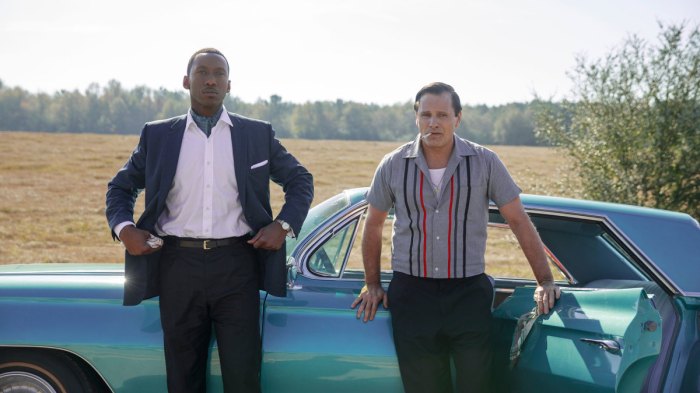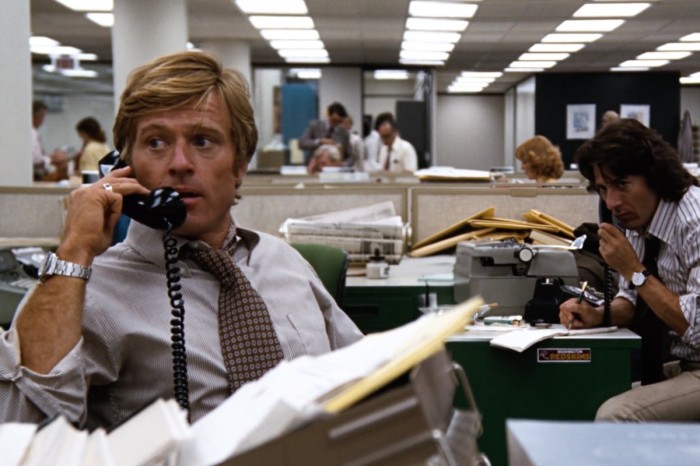Ahh, March. The month that comes in like a lion, and supposedly (this remains to be seen) goes out like a lamb. The month that – this year at least – steals a precious hour from all of us. The month that often subconsciously suggests a bout of spring cleaning, and so I’m here to clear my proverbial desk of movies that I’ve recently seen but haven’t had the time to devote an entire post to. As it were, it just so happens that all of the movies I’m here to briefly discuss won at least one Oscar – three films from this year, and one from all the way back in 1977 – and while the actual evolving cultural importance of the Oscars remains to be seen, especially given recent events (Steven Spielberg’s recent comments about banning Netflix films like Roma from awards consideration particularly tickled me), I think they’re worthy of mention, if only to bring up their seldom-whispered faults and provide a dissenting opinion in an endless sea of praise.

Spider-Man: Into the Spider-verse (Winner: Best Animated Feature) – I was actually lucky enough to see Spider-verse in theaters, even though I went last week, due to its timely re-release to coincide with its Best Animated Feature win. The high points here are the visuals, the stellar voice acting across the board, and the soundtrack, with the latter being notable both for its use of Post Malone’s “Sunflower” and its unique record-scratching score from British composer Daniel Pemberton. While the plot features a few weak spots – namely, Miles Morales spending three quarters of the film not thinking he has what it takes to be Spider-man, and then suddenly in a split-second moment of lukewarm emotional catharsis mastering all his powers – it’s funny enough and possessing of enough comic book nerd in-jokes to forgive, and the lame resolution of Morales’ final battle against Kingpin is similarly erased by a cliffhanger ending that promises much more from the multiverse concept, which in terms of franchise material has some serious juice. For the sake of sheer inventiveness if nothing else, it’s well-deserving of its Oscar.

Green Book (Winner: Best Original Screenplay, Best Picture, Best Supporting Actor, Nominee: Best Actor, Best Film Editing) – In light of its controversial Best Picture win, there seems to be a lot more talk about Green Book these days than there was when it was actively in theaters, and for good reason (people like complaining about stuff when it’s actively in the spotlight, for one). I stand by my mini-review from my Oscars post that claims it to be a great film, and I also am in general agreement with Mahershala Ali‘s (second) Best Supporting Actor win as well as the film’s Best Original Screenplay win, but I’ve also found that a number of cogent points about the seeming dubious nature of its Best Picture win – namely regarding its treatment of race relations as a “dramatic equation to be solved” and the Shirley family’s claim of historical inaccuracy – have been made, specifically in this fantastic article from the LA Times. Rather than regurgitate that article’s additional points of interest here, I’ll just direct you to it, but not without noting first that I don’t agree remotely with its clickbait-y title – in spite of its issues, Green Book is without a doubt not as bad a Best Picture winner as Crash. Seriously – if you haven’t seen Crash, probably don’t, but at the same time, it may be worth watching just to know how absurd the Academy’s decision-making can get.

Bohemian Rhapsody (Winner: Best Actor, Best Sound Mixing, Best Sound Editing, Best Film Editing, Nominee: Best Picture) – This is where my potentially unpopular hot takes are hidden in this post: that is to say, upon continued reflection after watching it this past weekend, I’ve decided that I simply didn’t think Bohemian Rhapsody was all that good. While I’ll grant the filmmakers that the Live Aid scene that serves as the climactic ending of the film is near-perfect, the other supposedly lauded elements of the film were aspects that I found nothing more than underwhelming, starting with Rami Malek‘s performance as the all-important musical icon Freddie Mercury, which was more often limp than it was electrifying. Rhapsody‘s win for Best Film Editing is especially confusing, though, given its penchant for quick cuts that are more often disorienting than useful (see here: it’s nowhere near Oliver Megaton levels, but it’s trending in that direction for sure). With all that said, the music is great, and in spite of the film’s blatant timeline manipulation to create a dramatically potent second act, it’s a must watch for Queen fans ranging from casual to hardcore, even if the majority of the film comes off as a manufactured prelude to the concert at its end.

BONUS: All the President’s Men (1977 – Winner: Best Adapted Screenplay, Best Supporting Actor, Best Sound Mixing, Best Production Design, Nominee: Best Picture, Best Director, Best Supporting Actress, Best Film Editing) – Full disclosure, I watched this film – presumed by many to be one of the all-time greats – on a plane, so I’d consider my viewing experience far from ideal, but with that said, where All The President’s Men impresses is in its painstaking attention to detail and its commitment to journalistic integrity (something you’ll find that a few of the above fact-based films don’t seem to care a whole lot about). Don’t get me wrong – there’s a lot of 70s filmmaking here that simply fails to translate to 2019, and most of the events of the film amount to artfully long but occasionally dull takes of Robert Redford chatting with folks on the phone. While Woodward and Bernstein clearly did some great things, a lot of what they did to uncover the depth of the Watergate scandal (and, based on what this film portrays, the way they often treated women) seems now to have been really, really slimy, and furthermore, the film has definite and palpable pacing issues. It’s worth showing up purely for the performances of Dustin Hoffman (Carl Bernstein) and Redford (Bob Woodward), though, who purportedly memorized each other’s lines just so they could convincingly interrupt each other during some of the film’s rare harried moments. Don’t sleep on the late great Jason Robards‘ turn as Washington Post editor Ben Bradlee (played last year by Tom Hanks in one of last year’s Academy darlings, The Post, a film which I also watched recently and found to be rather subpar, including but not limited to Hanks’ performance) either.
As always, thanks for reading! With another awards season in the books, we’ll move on to what’s clearly March’s biggest release next week: Captain Marvel.
P.S. – I promise this is my last post involving the Oscars in any way shape or form for a while.
[…] by the same Dexter Fletcher who produced 2018’s awards darling Bohemian Rhapsody (which I found to be a little underwhelming). While I’m certainly a fan of John’s, and while I […]
LikeLike